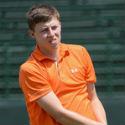
Matthew Fitzpatrick
SHEFFIELD, England – “Well grounded” might be the best expression to describe Matt Fitzpatrick. If the reigning U.S. Amateur champion has ideas above his station, then he keeps them hidden deep inside.
There’s a sense that Fitzpatrick is almost embarrassed to express ambitions, scared to utter his dreams in case someone reminds him of where he’s from. That would be Sheffield, England, a working-class steel town where the locals don’t take kindly to braggarts.
Even Fitzpatrick, 19, finds it hard to believe he will tee it up in next week’s Masters, plus starts in the U.S. Open and Open Championship, the rewards that go with winning America’s national amateur. He missed the cut at the recent Arnold Palmer Invitational and has received an invitation to the RBC Heritage the week after the Masters. He also is waiting to hear from the PGA Tour’s Quicken Loans National and the European Tour’s Aberdeen Asset Management Scottish Open.
“It’s all a bit surreal,” Fitzpatrick said. “I didn’t have a clue where I’d be at this point in my life when I first started playing golf. I never saw myself playing in majors.”
Like many youngsters, Fitzpatrick got started in golf because of his parents. His father, Russell, has played to as low as a 1 handicap, and his mother, Sue, and younger brother, Alex, also play.
Sue Fitzpatrick kick-started her son’s career with group lessons at Hallamshire Golf Club when he was 9. Soon afterward, Hallamshire professional Tom Armitage encouraged Fitzpatrick to join the club, and he has been a member ever since.
Fitzpatrick came to prominence in 2012 when he won the British Boys’ Championship at age 17. In the scheduled 36-hole final, he beat Welsh amateur Henry James, 10 and 8.
Even then Fitzpatrick didn’t think it would lead to his steller 2013 season: low amateur in the Open Championship, becoming the first Englishman since Harold Hilton in 1911 to win the U.S. Amateur and compiling a 3-1 record in the Walker Cup.
“I didn’t think I had a future in the game after I won the British Boys’,” he said. “It was a good achievement, but it wasn’t as if a light went on in my head that said I’ve got a chance to do something in this game. It wasn’t until I qualified for the Open and made the cut that I realized I might have a future in the game.”
Welshman Nigel Edwards first met Fitzpatrick at an England Golf training session in January 2012, when he took over as performance director.
“I wouldn’t say he jumped out as one who would go on to win the U.S. Amateur,” said Edwards, who captained Great Britain & Ireland’s Walker Cup team. “He was obviously a good player, but he’s grown enormously since then. He’s found an inner confidence that has lifted him above the parapet.”
After his British Boys’ success, Fitzpatrick accepted a scholarship to Northwestern. Like many Brits who enter the U.S. college system, Fitzpatrick got something of a shock. He lasted only four months.
“I found it hard to balance golf and schoolwork,” he said. “I found the work so difficult. And I wasn’t getting as much time to practice.
“Probably the biggest thing was being so far away from my coach (Mike Walker). Communication is important, and that only comes from being one on one.”
Popular opinion says Fitzpatrick might have stayed at Northwestern, if not for his breakthrough summer. He committed to coach Pat Goss in November 2012 but by the time Fitzpatrick arrived on the Evanston, Ill., campus in September, his life had turned upside down. Popular opinion also says Fitzpatrick’s 2013 success has encouraged him to turn professional later this summer.
Fitzpatrick is having none of it.
“Tour (Qualifying) School is not on my mind, at this point,” he said. “I want to defend my U.S. Amateur title, and then I’ll take it from there. Pete (Cowen, a coach) has said you have to sell your stock while it’s at its highest. So if, say, I have a good finish in the Masters, then I’d consider it.”
Fitzpatrick’s pragmatism probably comes from his Sheffield upbringing, said Mark Roe, a fellow Sheffield native and former touring pro.
“Self-deprecation is big in the north of England and working-class towns like Sheffield,” said Roe, who won three times on the European Tour. “People won’t allow you to get big-headed because they’ll shoot you down.”
Edwards has worked with many amateurs over the years in his role for England and his previous job as director of player development and coaching at the Golf Union of Wales. He calls Fitzpatrick “very grounded, very down-to-earth and unassuming. He’s got a lot of confidence, but he doesn’t shout from the rooftops.”
As for the future, Fitzpatrick is vague other than Augusta.
“I’d like to be low amateur and take it from there,” he said. “Winning on whatever tour it is, maybe challenging for majors, that would be a success for me at this stage. You never know where the game’s going to take you. I haven’t thought too much about the future. I’ll work hard and take it as it comes.”
As Roe knows, the teen’s roots should keep him focused.
“Hallamshire’s a normal golf club in Sheffield, at the top of a hill, not a leafy country club,” Roe said. “In Sheffield, you work hard and be glad for what you’ve achieved rather than feel you deserve your achievements. That background will stand him in good stead.”